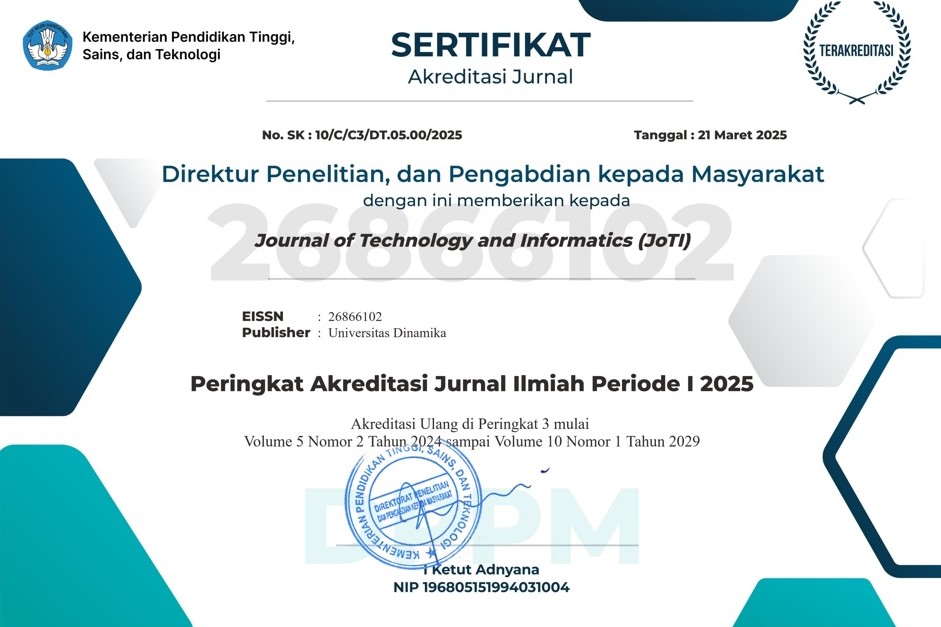Customer Satisfaction, Social Influence, and Facilitating Conditions Affecting Use Behavior in Ride-Hailing
DOI:
https://doi.org/10.37802/joti.v7i2.1222Keywords:
Behavioral, Conditions, Customer, Facilitating, Satisfaction, Social InfluenceAbstract
The rapid expansion of online ride-hailing services has transformed urban mobility; however, sustaining user engagement remains a major challenge due to the interplay of psychological and technical factors. Despite widespread adoption, the determinants influencing users’ continued use of such applications remain inconsistent and not fully understood. Therefore, this study examines the effects of Customer Satisfaction (CS), Social Influence (SI), and Facilitating Conditions (FC) on Use Behavior (UB) of online transportation applications, with Behavioral Intention (BI) as a mediating variable. The research was conducted in Surabaya with 150 active users of online ride-hailing services, and data were analyzed using Structural Equation Modeling–Partial Least Squares (SEM-PLS). The findings indicate that FC significantly affects both BI and UB, while CS and SI have significant positive effects on BI but not directly on UB. Moreover, BI is identified as the strongest predictor of UB and acts as a significant mediator in the relationships CS → BI → UB, SI → BI → UB, and FC → BI → UB. These results highlight the central role of intention in linking psychological and technical factors to actual use behavior. The study suggests that service providers enhance customer satisfaction, utilize social influence, and strengthen facilitating conditions to sustain user engagement.
Downloads
References
L. Sun, R. H. Teunter, G. Hua, and T. Wu, “Taxi-hailing platforms: Inform or Assign drivers?,” Transportation Research Part B: Methodological, vol. 142, pp. 197–212, Dec. 2020, doi: 10.1016/j.trb.2020.10.001.
I. Mavlutova, D. Atstaja, J. Grasis, J. Kuzmina, I. Uvarova, and D. Roga, “Urban Transportation Concept and Sustainable Urban Mobility in Smart Cities: A Review,” Apr. 01, 2023, MDPI. doi: 10.3390/en16083585.
R. Filieri, F. Acikgoz, V. Ndou, and Y. K. Dwivedi, “Is TripAdvisor still relevant? The influence of review credibility, review usefulness, and ease of use on consumers’ continuance intention.”
C. Wang, G. Wu, X. Zhou, and Y. Lv, “An Empirical Study of the Factors Influencing User Behavior of Fitness Software in College Students Based on UTAUT,” Sustainability (Switzerland), vol. 14, no. 15, Aug. 2022, doi: 10.3390/su14159720.
N. Songkram and H. Osuwan, “Applying the Technology Acceptance Model to Elucidate K-12 Teachers’ Use of Digital Learning Platforms in Thailand during the COVID-19 Pandemic,” Sustainability (Switzerland), vol. 14, no. 10, May 2022, doi: 10.3390/su14106027.
J. Guo, W. Zhang, and T. Xia, “Impact of Shopping Website Design on Customer Satisfaction and Loyalty: The Mediating Role of Usability and the Moderating Role of Trust,” Sustainability (Switzerland), vol. 15, no. 8, Apr. 2023, doi: 10.3390/su15086347.
J. Guo, W. Zhang, and T. Xia, “Impact of Shopping Website Design on Customer Satisfaction and Loyalty: The Mediating Role of Usability and the Moderating Role of Trust,” Sustainability (Switzerland), vol. 15, no. 8, Apr. 2023, doi: 10.3390/su15086347.
S. Chatterjee, N. P. Rana, S. Khorana, P. Mikalef, and A. Sharma, “Assessing Organizational Users’ Intentions and Behavior to AI Integrated CRM Systems: a Meta-UTAUT Approach,” Information Systems Frontiers, vol. 25, no. 4, pp. 1299–1313, Aug. 2023, doi: 10.1007/s10796-021-10181-1.
S. Schukat and H. Heise, “Towards an understanding of the behavioral intentions and actual use of smart products among german farmers,” Sustainability (Switzerland), vol. 13, no. 12, Jun. 2021, doi: 10.3390/su13126666.
E.-M. Schomakers, C. Lidynia, L. S. Vervier, A. Calero Valdez, and M. Ziefle, “Applying an Extended UTAUT2 Model to Explain User Acceptance of Lifestyle and Therapy Mobile Health Apps: Survey Study,” JMIR Mhealth Uhealth, vol. 10, no. 1, p. e27095, Jan. 2022, doi: 10.2196/27095.
A. N. Yogatama and A. P. Wardhanie, “Peran E-Service Quality Dalam Meningkatkan Penjualan Makanan Melalui Penggunaan Aplikasi ShopeeFood,” Journal of Technology and Informatics (JoTI), vol. 3, no. 2.
N. Monica Hidayat, M. Nasrullah, and N. Pudji Istyanto, “Analisis Unified Theory Of Acceptance And Use Of Technology (UTAUT) Terhadap Penerimaan Adopsi Teknologi E-Learning Pada Fitur Video Conference Di Kalangan Mahasiswa Kampus Baru (Studi Kasus: ITTelkom Surabaya),” Journal of Technology and Informatics (JoTI), vol. 4, no. 1, pp. 18–25, Oct. 2022, doi: 10.37802/joti.v4i1.258.
J. J. R. M. S. C. M. R. Joseph F. Hair, “When to use and how to report the results of PLS-SEM,” European Business Review, vol. 31, no. 1, Jan. 2019.
Y. Liu-Thompkins, S. Okazaki, and H. Li, “Artificial empathy in marketing interactions: Bridging the human-AI gap in affective and social customer experience,” J Acad Mark Sci, vol. 50, no. 6, pp. 1198–1218, Nov. 2022, doi: 10.1007/s11747-022-00892-5.
S. Chatterjee, N. P. Rana, S. Khorana, P. Mikalef, and A. Sharma, “Assessing Organizational Users’ Intentions and Behavior to AI Integrated CRM Systems: a Meta-UTAUT Approach,” Information Systems Frontiers, vol. 25, no. 4, pp. 1299–1313, Aug. 2023, doi: 10.1007/s10796-021-10181-1.
R. Palau-Saumell, S. Forgas-Coll, J. Sánchez-García, and E. Robres, “User acceptance of mobile apps for restaurants: An expanded and extended UTAUT-2,” Sustainability (Switzerland), vol. 11, no. 4, 2019, doi: 10.3390/su11041210.
V. Rosmayanti, N. Noni, and A. A. Patak, “Students’ Acceptance of Technology Use in Learning English Pharmacy,” International Journal of Language Education, vol. 6, no. 3, pp. 314–331, 2022, doi: 10.26858/ijole.v6i3.24144.
J. M. Sahut and R. Lissillour, “The adoption of remote work platforms after the Covid-19 lockdown: New approach, new evidence,” J Bus Res, vol. 154, Jan. 2023, doi: 10.1016/j.jbusres.2022.113345.
J. E. Lyu and J. Zhang, “An empirical study into consumer acceptance of dockless bikes sharing system based on tam,” Sustainability (Switzerland), vol. 13, no. 4, pp. 1–16, Feb. 2021, doi: 10.3390/su13041831.
S. Schukat and H. Heise, “Towards an understanding of the behavioral intentions and actual use of smart products among german farmers,” Sustainability (Switzerland), vol. 13, no. 12, Jun. 2021, doi: 10.3390/su13126666.
C. Wang, G. Wu, X. Zhou, and Y. Lv, “An Empirical Study of the Factors Influencing User Behavior of Fitness Software in College Students Based on UTAUT,” Sustainability (Switzerland), vol. 14, no. 15, Aug. 2022, doi: 10.3390/su14159720.
K. M. White, J. R. Smith, D. J. Terry, J. H. Greenslade, and B. M. Mckimmie, “Social influence in the theory of planned behaviour: The role of descriptive, injunctive, and ingroup norms.”
W. Choi et al., “Study of the factors influencing the use of MyData platform based on personal health record data sharing system,” BMC Med Inform Decis Mak, vol. 22, no. 1, Dec. 2022, doi: 10.1186/s12911-022-01929-z.
E.-M. Schomakers, C. Lidynia, L. S. Vervier, A. Calero Valdez, and M. Ziefle, “Applying an Extended UTAUT2 Model to Explain User Acceptance of Lifestyle and Therapy Mobile Health Apps: Survey Study,” JMIR Mhealth Uhealth, vol. 10, no. 1, p. e27095, Jan. 2022, doi: 10.2196/27095.
J. P. Onnela and F. Reed-Tsochas, “Spontaneous emergence of social influence in online systems,” Proc Natl Acad Sci U S A, vol. 107, no. 43, pp. 18375–18380, Oct. 2010, doi: 10.1073/pnas.0914572107.
Sulistiowati, “Examining mobile learning adoption: The role of ease of use, usefulness, and intention,” TEKNOSAINS: Jurnal Sains, Teknologi dan Informatika, vol. 12, pp. 264–270, 2025.
S. Chatterjee, N. P. Rana, S. Khorana, P. Mikalef, and A. Sharma, “Assessing Organizational Users’ Intentions and Behavior to AI Integrated CRM Systems: a Meta-UTAUT Approach,” Information Systems Frontiers, vol. 25, no. 4, pp. 1299–1313, Aug. 2023, doi: 10.1007/s10796-021-10181-1.
Y. K. Dwivedi, E. Ismagilova, P. Sarker, A. Jeyaraj, Y. Jadil, and L. Hughes, “A Meta-Analytic Structural Equation Model for Understanding Social Commerce Adoption,” Information Systems Frontiers, vol. 25, no. 4, pp. 1421–1437, Aug. 2023, doi: 10.1007/s10796-021-10172-2.
C. Wang, G. Wu, X. Zhou, and Y. Lv, “An Empirical Study of the Factors Influencing User Behavior of Fitness Software in College Students Based on UTAUT,” Sustainability (Switzerland), vol. 14, no. 15, Aug. 2022, doi: 10.3390/su14159720.
Downloads
Issue
Section
License
Copyright (c) 2025 Journal of Technology and Informatics (JoTI)

This work is licensed under a Creative Commons Attribution-ShareAlike 4.0 International License.


















